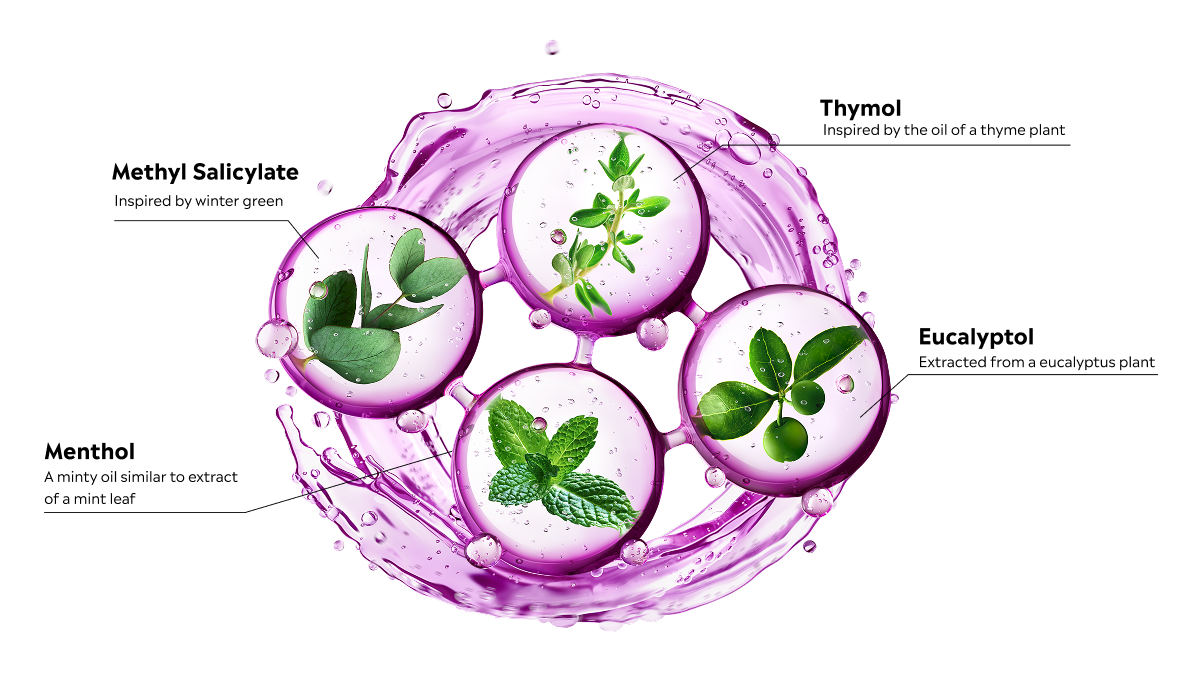ALCOHOL-CONTAINING RINSES HAVE NO CAUSAL LINK TO ORAL DRYNESS
In clinical trials:
Safe for xerostomic patients2
Does not promote oral dryness2-4
Fischman et al. American Journal of Dentistry 2004;17(1):23-262
14 days of exaggerated use (3x per day; more than recommended dose) by subjects xerostomic as a result of Sjogren’s syndrome
Finding: Favorable tolerability, no drying of oral mucosa, and no decreased salivary flow rates
Kerr et al. Quintessance International 2007;38(8):41-483
2-week randomized, crossover pilot studying the use of alcohol and non-alcohol-containing mouthrinses in healthy adults
Finding: No significant differences in salivary flow rates or patient-reported sensations of dry mouth between alcohol and non-alcohol-containing mouthrinse groups
Kerr et al. Oral Surgery, Oral Medicine, Oral Pathology, Oral Radiology 2015;119(1):59-644
3-month clinical study comparing 2 mouthrinses on salivary flow and perceived dryness
Finding: Alcohol-based essential oil mouthrinse no more likely to cause a reduction in salivary flow or perceived dryness than a non-alcohol-based cetyl pyridinium chloride (CPC) mouthrinse
ALCOHOL-CONTAINING RINSES HAVE NO LINK TO ORAL CANCER
In clinical trials:
No credible link to oral cancer5-8
LISTERINE® Antiseptic is the most extensively tested mouthwash in the world, with over 30 long-term clinical trials examining its safety and efficacy1
Food and Drug Administration. 2003 Federal Register 2003;68(103):32232-322875
FDA subcommittee reviewed 7 case-control studies
Conclusion: “Data do not support a causal relationship between the use of alcohol-containing mouthrinses and oral cancer. The vote was unanimous….”
Cole et al. Journal of the American Dental Association 2003;34(8):1079-10876
Review of 9 case-control studies, published in JADA
Finding: alcohol-containing mouthwash does not increase risk of oropharyngeal cancer
La Vecchia. Oral Oncology 2009;45:198-2007
Critical review of published data
Finding: Link between mouthwash use (specifically alcohol-containing mouthwash) and oral cancer is not supported by epidemiological evidence
Boyle et al. Oral Surgery, Oral Medicine, Oral Pathology, Oral Radiology, and Endodontology 2011;112(6):e1308
Finding: no association between use of mouthwash containing alcohol and oral cancer risk
References:
1. Data on file, Johnson & Johnson Consumer Inc.
2. Fischman SL, Aquirre A, Charles CH. Use of essential oil-containing mouthrinses by xerostomic individuals: determination of potential for oral mucosal irritation. Am J Dent. 2004;17:23-26.
3. Kerr AR, Katz RW, Ship JA. A comparison of the effects of 2 commercially available nonprescription mouthrinses on salivary flow rates and xerostomia. Quintessence Int. 2007;38(705):41-48.
4. Kerr AR, Corby PM, Kalliontzi K, McGuire JA, Charles CA. Comparison of two mouthrinses in relation to salivary flow and perceived dryness. Oral Surg Oral Med Oral Pathol Oral Radiol. 2015;119(1):59-64.
5. Food and Drug Administration. Oral health care drug products for over-the-counter human use; antigingivitis/antiplaque drug products; establishment of a monograph; proposed rules. Part III. Federal Register. 2003;68(103):32232-32287.
6. Cole P, Rodu B, Mathisen A. Alcohol-containing mouthwash and oropharyngeal cancer: a review of the epidemiology. J Am Dent Assoc. 2003;134:1079-1087.
7. La Vecchia C. Mouthwash and oral cancer risk: an update. Oral Oncol. 2009;45(3):198-200.
8. Boyle P, Gandini S, Boffetta P, Negri E, La Vecchia C. Mouthwash use and oral cancer risk: quantitative meta-analysis of epidemiologic studies. Oral Surg Oral Med Oral Pathol Oral Radiol Endod. 2011;112(6):e130.



